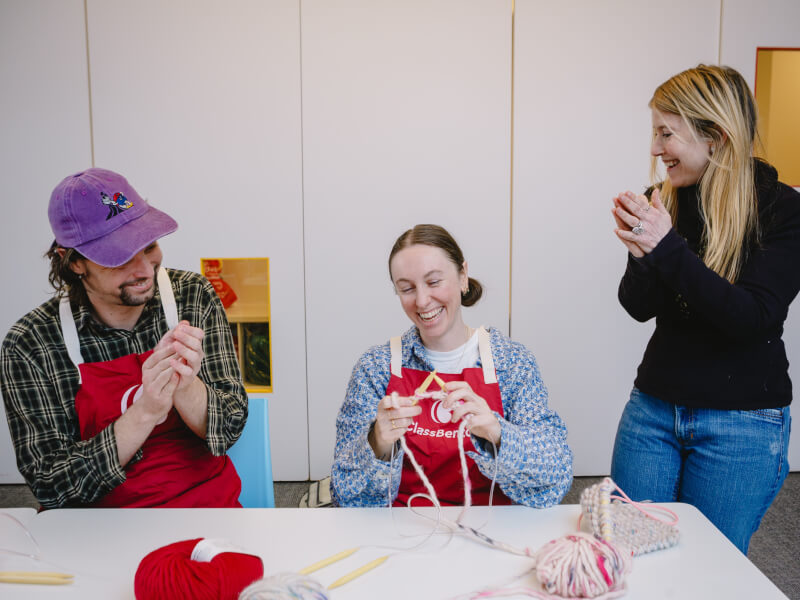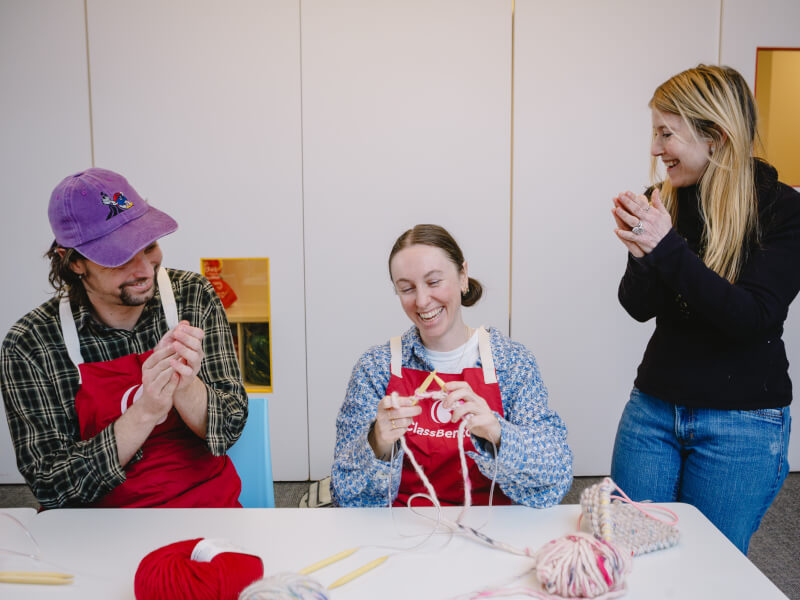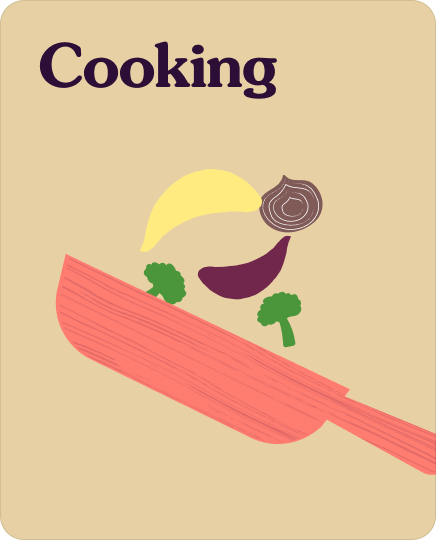In this story:
Looking after your mental health doesn’t have to feel like another chore on the to-do list. Sometimes it’s the small, joyful moments—picking up a paintbrush, catching up with a friend or simply taking a deep breath—that make the biggest difference. At ClassBento, we believe creativity and connection are powerful tools for feeling good, and there are plenty of simple ways you can weave them into your day. Plus, research suggests that good mental wellbeing is linked with better brain health and may even lower your risk of developing dementia, a cause we're super passionate about.
From sipping more H₂O to learning to knit, here are eight easy, mood-boosting ideas you can try right now to support your wellbeing.
1. Breathe with intention

The need-to-know:
Breathing exercises are a proven and effective way to relax your mind and body.
Let’s break it down:
Most of us don’t pay attention to our breathing, and for good reason: Your autonomic nervous system takes care of the whole inhale-exhale thing for you. But there are moments in life when it makes sense to breathe with intention. When you’re feeling stressed or overwhelmed, controlled breathing can help. Slow, deep breaths signal to your body that it can relax, helping you transition from fight-or-flight to rest-and-digest.
The takeaway:
Breathing exercises are one of the simplest ways to relieve feelings of stress, anxiety and overwhelm. Start with a simple technique like box breathing. Simply inhale, hold, exhale and hold again – all for a count of four.
2. Move your body
The need-to-know:
We all have poor mental health days, but people who exercise regularly experience them less. (40% less, to be exact.)
Let’s break it down:
On average, a person experiences around 3.4 poor mental health days a month, according to a survey of 1.2 million people conducted by the Centers for Disease Control and Prevention. But for people who exercise, that number drops by 40%.
The takeaway:
Three to five 45-minute movement sessions per week is the sweet spot when it comes to boosting your mental health. Which type of exercise is best, you ask? Well, that’s simple: the one you’ll actually do.
3. Drink enough water
The need-to-know:
Your brain is composed of 70 to 80 per cent water, so it’s no surprise dehydration impacts your memory, attention span and – you guessed it – mental health.
Let’s break it down:
A 2018 study found that participants who drank more than five cups of water a day had lower anxiety and depression scores than participants who drank less than two cups per day.
The takeaway:
For brain-boosting benefits, aim for more than two litres (8 to 10 cups) of water per day. If this sounds unachievable, try sipping on small amounts of H₂O throughout the day, buying yourself a cute water bottle or adding some lemon, lime or mint to jazz it up.
4. Learn to knit

The need-to-know:
Knitting has the power to streamline your thoughts and focus your mind.
Let’s break it down:
In a 2023 study on the link between mental health and yarncraft, participants used knitting “as a way of coping with or reducing symptoms such as anxiety, depression, and pain.” It was found to have a therapeutic, calming effect that could be used to prevent spiralling thoughts.
The takeaway:
Keeping your hands engaged in a repetitive, rhythmic activity like knitting can help your mind move into a more meditative state. Not sure how to start? Learn to knit with us!
5. Connect with a friend

The need-to-know:
Social connections play a vital role in maintaining good mental health. And with an estimated one in three Aussies experiencing loneliness at least once a week, seeking social support is more important than ever.
Let’s break it down:
According to an article published in the Journal of World Psychiatry, social connection is widely acknowledged as a fundamental human need that’s “linked to higher wellbeing, safety, resilience and prosperity.” Connecting with friends, family and other support networks can also protect against depressive symptoms and promote mental wellbeing.
The takeaway:
You don’t have to catch up with a friend for two hours a day, but try to prioritise regular social connections. Call your mum, text a friend or take some time to chat with your barista. When necessary, make use of mental health helplines or join an online community group.
6. Take a power nap
The need-to-know:
When it comes to mental health, sleep is your superpower. According to Beyond Blue, getting enough Zzz’s can improve your mood, memory and ability to manage stress.
Let’s break it down:
A 2021 meta-analysis found that mental health challenges and suboptimal sleep are linked. While it was previously assumed that mental health difficulties led to sleeping problems, it’s more like a two-way street. According to the authors, “poor sleep contributes to the onset, recurrence and maintenance of mental health difficulties.”
The takeaway:
We get it. Snoozing for 7 to 9 hours every night is easier said than done – but by making small changes to your nighttime routine, you can start clocking more minutes. A few hours before bed, consider cutting screen time, dimming the lights, writing down your thoughts, taking a warm shower or reading a book. (Pro tip: Avoid true crime!)
7. Examine unhelpful thoughts
The need-to-know:
Putting unhelpful thoughts under the (metaphorical) microscope can help you reframe difficult situations.
Let’s break it down:
Reframing unhelpful thoughts is a self-help strategy commonly used in Cognitive Behavioural Therapy (CBT). Rather than accepting unhelpful thoughts as fact, you can check them and change them. Ask yourself: Is there strong evidence to support this thought? Are there other explanations I could consider? What would I say to a loved one experiencing the same thoughts?
The takeaway:
Reframing unhelpful thoughts and replacing them with neutral or positive thoughts can help you step back, gain perspective and stop your mind from spiralling.
8. Get creative with clay

The need-to-know:
According to a 2025 paper, clay therapy can positively impact your mental health in two distinct ways, by:
- Offering “a sense of reality and substance” that grounds you in the present
- Helping you distance yourself from everyday life by engaging with the clay
Let’s break it down:
Another study, this one published in 2024, found that ceramic art courses can significantly reduce anxiety. Interestingly, the most anxiety-relieving part of the process was actually “slapping” the clay on the board. Yep, you heard it here first: You can officially slap your way to a better day.
The takeaway:
When using pottery as a self-care strategy, don’t focus on producing a piece of art. Take the pressure off, release your expectations and simply engage with the clay in a way that feels good. Need some help getting started? Check out our beginner’s pottery classes or order a clay hand building kit to play with at home!
From eating a nutritious diet to getting enough sunlight, there are so many simple ways to boost your mood and support and protect your mental health. Why not pick one tip from the list and try it today? We know which one we’ll be choosing. Slap, slap…








































